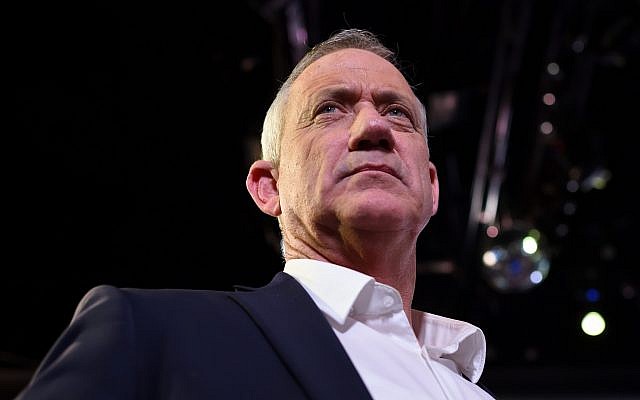Haaretz says Blue and White leader hopes to secure the support of smaller parties if his party gets more seats than Netanyahu’s Likud in elections

Blue and White party leader Benny Gantz may turn to ultra-Orthodox and some small right-wing parties to support his bid for the premiership following elections next week, an Israeli newspaper reported Tuesday.
Though Blue and White is polling ahead of Likud, surveys have forecast that he will struggle to form a governing coalition with a limited pool of center-left partners, even with the tacit support of Arab parties.
According to the Haaretz daily, Gantz has said in private conversations that if Blue and White receives at least four more seats than Likud, he will immediately reach out to the center-right Kulanu party, the right-wing libertarian Zehut party, and ultra-Orthodox parties Shas and United Torah Judaism.
Gantz will try to convince the parties, which are seen as natural ideological partners for Prime Minister Benjamin Netanyahu, by saying they can either join a government he heads that will last out its four-year term or one headed by Netanyahu that, in Gantz’s estimation, will collapse after eight months when Netanyahu is indicted for corruption, the report said.
Attorney General Avichai Mandelblit announced in February he intends to charge Netanyahu with bribery, fraud and breach of trust in a series of corruption cases. Netanyahu, who has denied any wrongdoing, can argue his case to Mandelblit during a hearing, after which the attorney general will decide whether to formally file charges.
Kulanu, Shas and UTJ, who have been allied with Netanyahu for the last three years, have all said they will continue to back the Likud leader, though Kulanu leader Moshe Kahlon has not ruled out partnering with Gantz.
Zehut, led by former Netanyahu rival Moshe Feiglin, has said he will back whichever potential prime minister gives him the best coalition deal.

Citing Blue and White sources, Haaretz said Gantz does not expect the heads of Zehut, Kulanu, Shas and UTJ to recommend he be given the first shot at forming a coalition, but hopes they will refrain from suggesting Netanyahu.
Following the elections, party leaders will recommend who they believe should be prime minister to President Reuven Rivlin, who will then task the faction he believes has the best chance at forming a government with leading coalition talks. Under Israeli law, this party does not have to be the largest and the choice of which faction to choose is at the president’s discretion.
The newspaper report also cited Gantz saying despite his lack of political experience, he will have no issue cobbling a large number of diverse parties into a coalition.

Gantz would have a difficult time convincing Shas and UTJ to join his coalition, given an agreement to rotate the premiership with Yair Lapid, who has sparred with the ultra-Orthodox.
Interior Minister Aryeh Deri, the leader of Shas, said in recordings aired by the Kan public broadcaster on Sunday that he would not join a coalition led by Blue and White even if the party canceled a rotation agreement between Gantz and Lapid to share the premiership.
Lapid joined his Yesh Atid party with Gantz’s Israel Resilience in February to form the Blue and White alliance, and under the terms of their electoral pact Lapid will take over from Gantz as prime minister after two-and-a-half years.
Lapid, who served as finance minister from 2013-14, has long drawn the ire of ultra-Orthodox parties for pushing to end the largely blanket exemptions to mandatory military service for seminary students and introducing the teaching of core subjects in religious schools.
As reported by The Times of Israel
